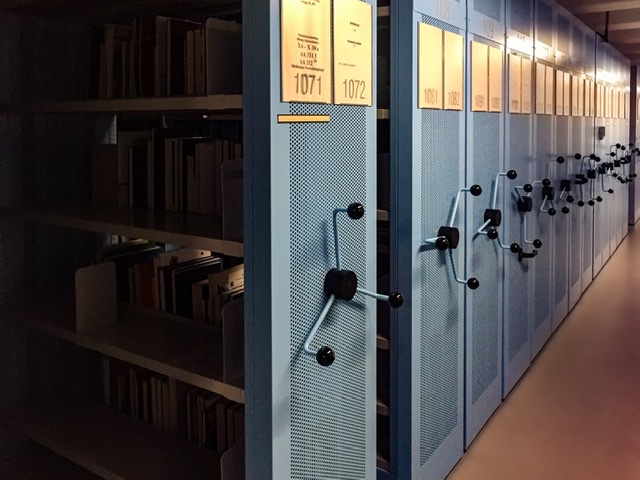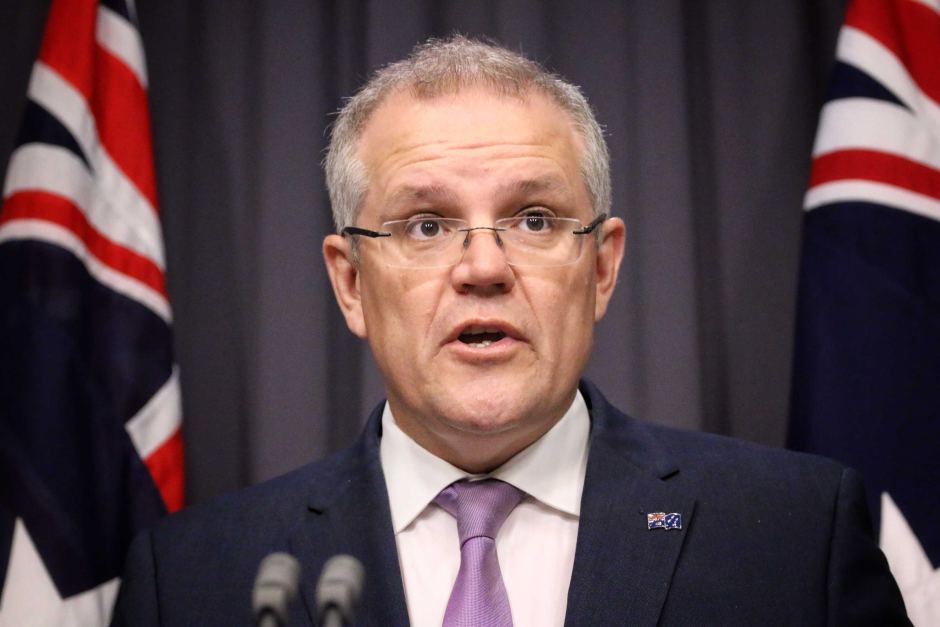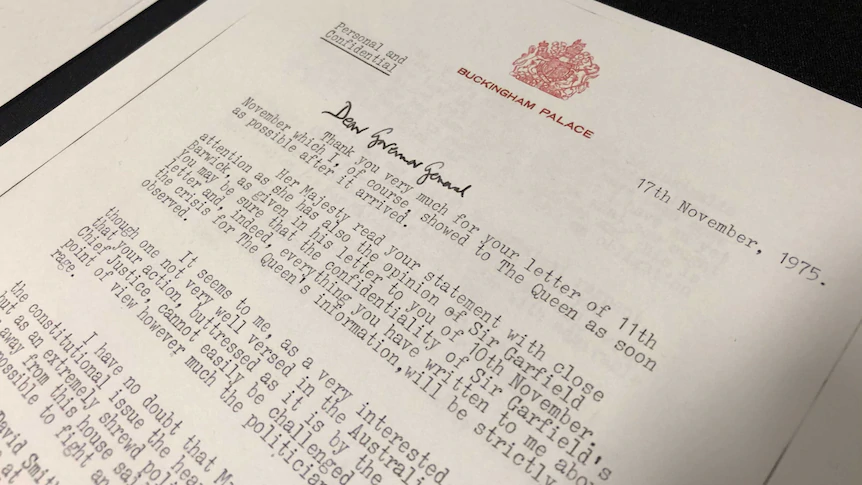Thousands of pages of the Queen’s secret letters to governors-general from Lord Casey to Sir William Deane, from 1965-2001, will soon be open to the public in the most significant release of royal documents since Sir John Kerr’s explosive ‘Palace letters’. The Archives’ decision to release the Queen’s correspondence with these six governors-general follows directly from the High Court’s 6:1 decision in the Palace letters case, which found that such letters are not ‘personal’ as the Archives had incorrectly claimed, ending the Queen’s embargo over them. Having lost so emphatically at the High Court, why is the Archives still involving the Queen in redactions from these letters of immeasurable significance to our history? (more…)
Jenny Hocking
-

A national disgrace: the National Archives turns to crowdfunding to save irreplaceable historic records
This week marks one year since the High Court handed down its landmark decision in the Palace letters case that letters between the Queen and the Governor-General Sir John Kerr are considered public documents, ending the Queen’s embargo and leading the Archives to release them. In what I described then as a moment of “legal colonial upstart-ery”, the High Court had broken through the barrier of royal secrecy which shields royal actions from public view and from history, something no other Commonwealth nation has yet achieved.
-

A week is a long time in politics and three weeks is even longer
Scott Morrison’s prime ministership began with a brazen betrayal, perfectly captured in the image of a beaming Morrison, arm slung around the shoulders of embattled Prime Minister Malcolm Turnbull declaring ‘this is my leader. I’m ambitious for him!’. Like every step along the Prime Minister’s political path it was entirely contrived, a matey display of faux fealty, friendship and political protection. Two days later, Malcolm Turnbull’s political career was over, and Scott Morrison stood in his place. It reads now as the defining image of his Prime Ministership – duplicitous, disloyal, and self-serving. (more…)
-
A royal abuse of political power
The revelations this week by The Guardian UK of the Queen’s secret intervention in political matters to protect her personal fortune are simply extraordinary. New documents from the UK Archives set out in excruciating detail the power of the monarch to vet legislation in her own interests. Under the guise of exercising the arcane ‘royal consent’, long considered a mere formality taken only on ministerial advice, the Queen and Prince Charles can secretly alter any Act that might affect the monarch personally. This they have done with alacrity.
-
‘You can set your political clock to it’: federal election looms
When the Murdoch media launch into its ritualistic ‘Labor leadership tensions’ routine it can only mean there’s an election on the horizon. But with a poll showing states rated ahead of the feds regarding administering the vaccine, it would appear trust is an issue that will continue to bedevil the Coalition.
-
EXCLUSIVE – National Archives to release hundreds of letters between the Queen and Governors-General.
The National Archives of Australia is set to release decades of correspondence between the Queen and Governors-General, from Sir Richard Casey in 1965 to Bill Hayden in 1996. The decision follows the High Court’s ruling in my landmark ‘Palace letters’ case against the Archives which, in May 2020, overturned the Queen’s embargo over her correspondence with Governor-General Sir John Kerr, much of it relating to the dismissal of the Whitlam government. (more…)
-
The Tamed Estate – cover-up of the Queen‘s role in the Dismissal by the National Archives and The Australian
The release of the Palace letters was pure theatre. Every element was meticulously stage-managed: the set, the props, the narrative. (From the Palace Letters pp 168-172) (more…)
-
Dissident Liberal senators poised to allow Whitlam’s budget to pass when Sir John Kerr struck
In this extract from her new book, The Palace Letters, Professor Jenny Hocking reveals key entries from dissident Liberal Senator Alan Missen’s ‘highly confidential diary on the 1975 constitutional crisis’. Five Liberal senators had resolved to abstain from a direct vote on the government’s supply bills, which would have enabled the bills to pass, just days before the dismissal of the Whitlam government. (more…)
-
The Palace Letters – in conversation with Jenny Hocking (video)
What do The Palace Letters tell us about our history, Gough Whitlam’s dismissal and our system of Government?
-
The question avoided by Kerr and the Palace ‘What does your Prime Minister say?’
In the rush to judgement on the Palace letters one image stands out – the early call, made before the letters had even been released – ‘the Queen was NOT informed!’. As if the entire cache of Palace letters could be read from just one letter, written by the key protagonist Sir John Kerr, after the event. (more…)
-
Letters of an insecure and indiscreet John Kerr make a mockery of the claim that the Queen played ‘no part’
The Palace letters have brought Kerr’s extensive, even obsessive, ‘reporting’ to the Queen into sharp relief, placing Kerr himself and his peculiar conception of his role as Governor-General under intense scrutiny. (more…)
-
The Palace Letters have blown apart the claim the Queen had no part in the Whitlam dismissal.
The letters show that the Queen’s responses, and at times even advice, particularly in relation to Kerr’s concern for his own position and the possible use of the reserve powers, played a critical role in his planning and in his eventual decision to dismiss the government. (more…)
-
Sir John Kerr’s secret ‘Palace letters’ to be released
History will be made this week with the release of hundreds of secret letters between the Queen and the Governor-General, Sir John Kerr, relating to Kerr’s 1975 dismissal of the Whitlam government. (more…)
-
JENNY HOCKING. High Court says ‘Release the Palace Letters’
In an emphatic 6:1 decision the High Court has ruled that the ‘Palace letters’ between the Governor-General and the Queen relating to the 1975 dismissal of the Whitlam government are Commonwealth records, ending the Queen’s embargo over them and opening them for public access under the Archives Act. (more…)
-
JENNY HOCKING supports Pearls and Irritations.
I am a long-time reader, contributor and supporter of Pearls & Irritations. (more…)
-
JENNY HOCKING. ‘If I were to terminate his commission’: Sir John Kerr’s secret ‘Palace letters on Whitlam’s dismissal
The final act in the landmark ‘Palace letters’ case seeking access to the Queen’s secret correspondence with the Governor-General, Sir John Kerr, relating to Kerr’s dismissal of the Whitlam government will play out in the High Court later this month. (more…)
-
PROFESSOR JENNY HOCKING The ‘Palace letters’ case at the High Court
Echoes of the Governor-General Sir John Kerr’s vice-regal dismissal of the Whitlam government reverberated across the High Court this week, as the long-running Palace letters case came before the full bench on appeal. (more…)
-
JENNY HOCKING. High Court to hear bid to release the Queen’s secret Whitlam dismissal letters.
As the Queen reels from one family crisis to another, Buckingham Palace would be looking on a little anxiously as the ‘Palace letters’ case is heard by the full bench of the High Court next week. (more…)
-
PROFESSOR JENNY HOCKING ‘I never had any doubts about the Palace’s attitude’: Sir John Kerr’s Royal secrets exposed
Letters between Sir John Kerr and Buckingham Palace show that the Palace pressured Kerr to omit from his autobiography his secret exchanges with the Queen’s private secretary before his dismissal of Prime Minister Gough Whitlam. This Royally sanctioned erasure is one of several crucial omissions from Kerr’s autobiography, which raise key questions about the ‘Palace letters’ between Kerr and the Queen leading up to the dismissal. (more…)
-
Brexit in the Antipodes
There is a growing air of desperation in the cross-party efforts to stymie British Prime Minister Boris Johnson’s threat to by-pass parliament, and even to ignore a motion of no confidence against him and his government by the House of Commons, in order to force through a no-deal Brexit. It is remarkable that in all the analyses of this political rupture and how best to avert it, the one example of the successful use of the very strategy that Johnson has laid out has been entirely overlooked. (more…)
-
JENNY HOCKING. ‘A tawdry distortion of history: How the Palace airbrushed Sir John Kerr’s Memoirs’
There have been dramatic revelations from the National Archives of Australia with the release of letters between the Governor-General Sir John Kerr and Buckingham Palace following Kerr’s dismissal of Prime Minister Gough Whitlam. These letters provide remarkable and disturbing new material on the dismissal of the Whitlam government and the role of the Palace. They not only confirm that Kerr was in secret contact with the Queen’s private secretary Sir Martin Charteris in the months before the dismissal, they also reveal that the Palace and Kerr then agreed to keep these ‘exchanges’ with Charteris hidden from public view, and from our history, by omitting any mention of them in Kerr’s later memoirs. (more…)
-
JENNY HOCKING. The ‘Palace letters’ case heads to the High Court
Professor Jenny Hocking’s long-running case against the National Archives of Australia seeking the release of the secret ‘Palace letters’ about the 1975 dismissal of the Whitlam government by the Governor-General, Sir John Kerr, stepped up again this week with the announcement of a Special Leave hearing in the High Court of Australia on 16 August. (more…)
-
A national humiliation. We are not allowed to read our own history: The Queen’s letters on Whitlam’s dismissal Remain Secret
As the media debated the political precedents for the Morrison government’s historic defeat in the House of Representatives last week – some pointing to the Bruce government in 1929, and others to the Fadden government in 1941 – largely forgotten was the more recent, and far more compelling, example of the 1975 defeat of the Fraser government in a crucial vote in the House of Representatives. At 3.15pm on 11 November 1975, the newly installed Fraser government comprehensively lost a confidence vote – not a legislative vote as Morrison did but a formal ‘want of confidence’ motion – by 10 votes. That Fraser’s historic parliamentary defeat has largely gone unnoticed despite its obvious relevance, says much about the persistent historical amnesia about the dismissal of the Whitlam government.
-
JENNY HOCKING. Historical myths die hard: What the Queen really knew about the dismissal of the Whitlam government
Historical myths die hard. And historical myths have plagued our understanding of the dismissal of the Whitlam Labor government by the Governor General, Sir John Kerr, on 11 November 1975. Chief among these foundational myths is the claim that the dismissal was a solo act by Kerr, a lonely and isolated decision, that no other person was involved in its planning or knew of its execution. Not the leader of the Opposition, not the High Court justices, and certainly not the Queen. (more…)
-
JENNY HOCKING. The Best of 2018: Royal distortions of history: why the Queen’s secret “Palace letters” about Gough Whitlam’s dismissal should be released.
The long-running ‘Palace letters’ case over the Queen’s secret correspondence regarding the 1975 dismissal of Prime Minister Gough Whitlam heads back to court on Wednesday 28 November, with an appeal hearing before the full bench of the Federal Court in Sydney. (more…)
-
JENNY HOCKING. Unmasking history: the Queen, the governor general and the Whitlam dismissal (The Guardian newspaper, 06.12.18)
The ghosts of the dismissal of the Whitlam government 43 years ago were on display at an appeal hearing before the full bench of the federal court last week: Gough Whitlam, the deposed prime minister; Sir John Kerr, the governor general who dismissed him; Malcolm Fraser, the leader of the opposition appointed by Kerr to replace Whitlam; and David Smith, the governor general’s official secretary. (more…)
-
JENNY HOCKING. Royal distortions of history: why the Queen’s secret “Palace letters” about Gough Whitlam’s dismissal should be released.
The long-running ‘Palace letters’ case over the Queen’s secret correspondence regarding the 1975 dismissal of Prime Minister Gough Whitlam heads back to court on Wednesday 28 November, with an appeal hearing before the full bench of the Federal Court in Sydney. (more…)
-
JENNY HOCKING. ‘Bullying, betrayal and backstabbing’: Can the Liberal party survive?
Scott Morrison is an unlikely Prime Minister. The day before the latest Liberal leadership change Morrison appeared in a memorable photo, arm casually draped around then Prime Minister Malcolm Turnbull’s uncomfortable shoulders, and proclaimed his support; ‘This is my leader. I’m ambitious – for him!’. Two days later Morrison emerged from a rancorous party meeting, brought on by the failed plotter and would-be Prime Minister Peter Dutton and his vengeful side-kick the deposed Prime Minister Tony Abbott, to become the third Liberal Prime Minister in as many years. The image and its aftermath have defined our 30th Prime Minister as duplicitous, disloyal and clearly ambitious – for himself. (more…)
-
JENNY HOCKING. Archival Manoeuvres in the Dark
This month’s federal court ruling that the ‘Palace letters’, between the Queen and the Governor-General at the time of the Whitlam dismissal, are ‘personal’ and not subject to the Archives Act means that this historic correspondence will remain under lock and key in the National Archives and embargoed ‘on the instructions of the Queen’, potentially indefinitely. (more…)
